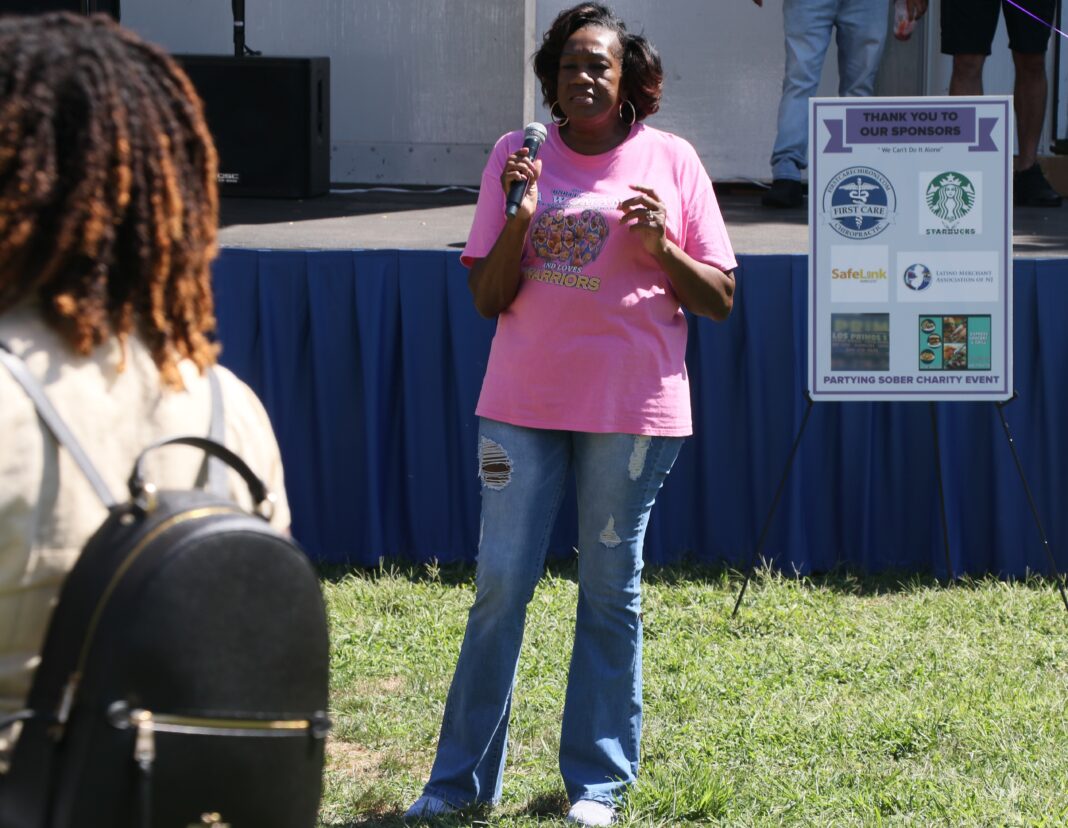MJ Goodwin sits on the wall at Mill Hill Park under shade as she tells her recovery story.
“I am one of seven children and the only girl; my mom and I were close, and when she passed away, I couldn’t deal with it. I could not deal with it at all. So, I got into cocaine,” Goodwin said.
She is a Trenton resident, and her path down the road of addiction started with skipping cocaine before moving into crack cocaine. “I never did anything else, never took pills, never drank, none of that stuff…but I went into a hole, and that hole of depression, which will kill you, almost killed me because I tried to take my life,” Goodwin said.
She was rushed to a crisis center, went into recovery that night, has been attending Narcotics Anonymous for nine years, and has been clean for the last six years. “Now I have four sponsees that I sponsor,” Goodwin said.
The Trenton United Family Foundation and The Empowerment house celebrated Goodwin and others like her on their road to recovery with the Third Annual Sobriety Party that brought music, guest speakers, and spoken word to Mill Hill Park.
Barbara Simmons was a speaker who talked about her passion for helping women coming out of prison by designing a halfway house to help receive mental health treatments.
“I was a woman from prison and had no place to go. I had all intentions of coming out, you know, staying clean, getting the job and being a productive member that they been talked about, that I lost due to my addiction,” Simmons said. However, she ended up in the same situation, the same house in the same area, before working on getting clean.
“So my goal is to give some women from prison a chance to come somewhere safe… and get the appropriate counseling, “Simmons said, “whether it be substance abuse counseling, mental health counseling, family counseling, whatever it is.”
In Mercer County, there were 3771 substance abuse admissions reported to the New Jersey Department of Human Services, Division of Mental Health and Addiction Services by substance abuse treatment providers. Of those, 2,130 of those admissions coming from Trenton, 56% of the overall residency, according to the 2021 study.
“It’s important that people see there are people just like you, people that are not in recovery, people that are suffering from the disease of addiction, that suffering from mental health. They often don’t speak out because of the stigma that’s placed upon these two diseases. So they must see their people around just like you at one time. So I want is important enough to let them know that this is what can happen for you,” Simmons said
The day was packed with vendors and sponsors like Henry J. Austin Health Center, McDonald’s, The HUTT App, and Recovery Is Essential, among just a few of the vendors that were set up. Vincent Bridgett Sr, Founder, united family foundation Executive Director explained that the day was for recovery. “It’s going great; a lot of vendors, a lot of sponsors, a lot of people came out to support…But it’s going well; we love it,” Bridgett said.
One vendor, in particular, helps current addicts receive aid. New Hope Integrated Behavioral Health Care. Founded more than 40 years ago as New Hope Foundation, New Hope Integrated Behavioral Health Care is a non-profit 501(c)3 corporation serving those in need of treatment for substance use, gambling, and other co-occurring mental health disorders.
Michael Melton, A teacher at New Hope and a former Alcoholic, explained that this is the last step in the 12-step program. “This helps me stay sober… Now you know I’m not going to be 100% of the time, but most of the time, I am. I pray every morning for him to heal my mind and point me to somebody to help when I’m helping; there’s no better feeling in the world.”
For those in recovery like Goodwin, the support system has been the blessing of a lifetime. “You’re not alone. I thought I was alone…When I got into recovery. It was the first time I felt like I had more than family. People you can call up…I can call them up at three in the afternoon or call them up at three in the morning and say I need help. They don’t even ask why. They say, ‘Where are you? We’re on our way,” Goodwin said.





